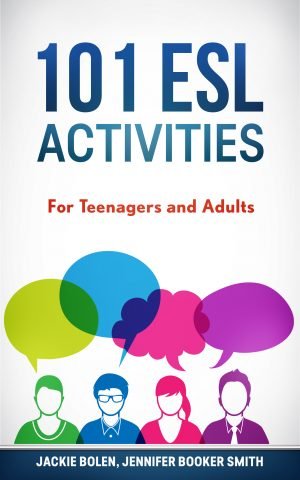Are you looking for some information about task-based teaching and learning, including activities, games, lesson plans and more? Then you’re certainly in the right place. Keep on reading for all the details you need to know about task based learning.

Task Based Language Learning and Teaching
Let’s get into the task based learning activities and ideas you need to know to get started.
Task Based Language Learning: The New Way of English Teaching
Task based language learning is kind of all the rage these days as part of the overall communicative approach. This focuses on having students being competent communicators as opposed to some of the older models like grammar-translation or the audio-lingual method. It’s a nice change of pace from the usual presentation practice production style of lesson or the test teach test approach. If you’re not familiar with task based language learning, here is a brief introduction to it.
Task based language learning can be an excellent choice for large classes. A class of 20+ students makes it impossible for students to get enough speaking time if it’s a teacher-centred classroom. Want to know more about where task-based teaching fits into the bigger picture? Check this out: Approaches and methods in language teaching.
6 Reasons to Consider Task Based Language Learning
There are a number of reasons why you might consider incorporating some task based activities into your English classes. However, here are some of my favourites.
#1: A Why
I personally love task-based activities because they give students a reason to do something as opposed to just using the language in a meaningless kind of way such as in a “repeat after me” activity. Students have to complete something, such as a presentation or some research about a country of their choice, including money and currency and then make a poster about it.
- Amazon Kindle Edition
- Bolen, Jackie (Author)
- English (Publication Language)
- 99 Pages - 06/22/2021 (Publication Date)
TBL can also make a really nice choice for ESL students who are studying in an English-speaking country, after immigrating for example. Find out more: ESL vs EFL.
#2: Learn what you Want to Learn
The second reason I like task based activities is that they give students a chance to explore the language they want to know. Instead of me telling them what grammar and vocabulary they need to learn, students discover what they need to know during the process, figure it out (with some help from me sometimes), use it and then often remember it for the long-term because it was something they sought out for themselves.
#3: Task Based Learning ESL Activities are Student-Centred
I’m ALL about student-centred language teaching. After all, students should be doing the hard work, not me! One of the main benefits of the task based approach is that students are engaged and working on something basically the entire time. The role of the teacher is to set up the activity, and offer some guidance and feedback but that’s about it.
Student-centred activities play a key role in creative an ideal learning environment.
#4: Learn How to Work in Groups with Task Based Learning Activities
I know that many students (and myself too!) often don’t like working in groups. However, this is a real-life kind of skill that our students can work on in our classes. I try to set up the tasks and offer guidance throughout so that students have a good experience with it.
#5: All About Meaning
Many textbooks and ESL activities focus on forms and while they do touch on real-life communication, it often feels kind of artificial. It’s nice to use task-based language teaching activities to get away from this once in a while. For example, the 10 tasks below focus on meaning and communication and far less on the exact right vocabulary word or grammatical phrase. It’s fun for students to try out their language skills in activities like these ones.
#6: They Appeal to Various Learning Styles
There are four main types of learning styles: visual, reading & writing, auditory, and kinesthetic. Task-based activities can target each type if a choice is given about how to execute the task. Learn more about it here:

Task based language teaching activities
Task Based Activities for English Learners
There are a number of activities you can use for task based language teaching. Here are some very practical things to consider doing in your classes.
#1: Vacations
A common task-based learning activity for ESL/EFL students is to get them to plan a vacation they’re going to take together as a group and then do a short presentation about it to the class, or submit a written assignment or video explaining it.
Something else that I’ve done when teaching in Korea which was quite successful was to explain a bit about my parents (age, interests, physical activity level, etc.) and then get the students to plan a 1-week trip around Korea for them. The results have generally been fantastic!
#2: What are you Cooking?
Here’s another example of a task-based learning ESL activity. The way it works is that in groups, students have to design a 3-course meal and then make a short presentation about it to the class. More details here:
What are you Cooking ESL Activity?
#3: Presentations
If I assign a presentation topic in my class, I’ll usually make the topic choices quite vague. For example, any current event. That way, students are free to choose whatever interests them, instead of letting my own interests dictate their learning.
Here’s one quick example. When I’m doing the unit on fruits and vegetables, I’ll put students into small groups, have them research a certain fruit or veggie, then make a poster and prepare a short presentation about it.
Or, if you’re teaching about seasons in English, divide the class into four groups and each group can do a short presentation about a season.
Another good idea is for the 7 continents or 5 oceans. Divide the class up into groups and each one can do some research and then a presentation about one of these things. More ideas here: continents and oceans activities.
#4: Essays
Or, for a persuasive essay that I assign for homework, I’ll give students the freedom to choose any topic they want. The only requirement is that they check in with me before starting so that they don’t go down the wrong track and waste time on something that is either too basic or too difficult.
- Amazon Kindle Edition
- Bolen, Jackie (Author)
- English (Publication Language)
- 187 Pages - 03/09/2016 (Publication Date)
#5: Directions and Task Based Language Teaching
Another common context is something like ESL directions. This works well because there is most definitely a reason why students have to talk to each other and a task to complete (finding a new location). More ideas here: Giving Direction ESL Activities.
#6: Current Events Poster and Presentation
An interesting activity I often do in my classes is to get my students to choose a current event that’s happening. Then, they have to make a poster and do a short presentation about it to the class.
In order to make it more of a “task-based” style activity, I allow my students to choose anything that’s, “in the news” so they’re free to talk about anything they want basically. More details here: Current Events Presentation Project.
#7: Information Gap Activities
Information gap activities are where each student has only half the information and they have to work together to get the complete picture. This is done by talking. Want to give it a try? Get more details here: Information Gap ESL Activities.
Want to know more about this kind of TEFL activity? Have a listen right here:
#8: Conduct an Interview and Report Results
A fun way to get students talking to each other about things they’re interested in is to get them to survey their classmates about one specific question. Once they’ve talked to at least 10 of them, they can take a look at their results and analyze them. Finally, they can report to the class what they learned.
You can try it out here: Just One Question.
#9: Plan a Class Party
If your course is coming to an end and you want to have a class party or celebration of some kind, get the students to plan the party for you! Set up some group rules first, including the following:
- time/date of the party
- location
- budget
- etc.
Then, students can make some plans, give a short presentation to the class and finally vote on which one you’ll do.
#10: Role Plays
A nice activity to include in a task-based lesson plan is a role play. This is particularly true if your students are studying English for a specific purpose (travel, medical or business English, etc.). The task is that students have to accomplish a certain thing. For example:
- Ask if a hotel has rooms available and find out how much it costs
- Talk to a patient in English who comes into their medical office
- Refuse a business offer but suggest an alternative one
#11: Choose your Own Adventure Group Writing Activity
There aren’t that many group writing activities but this one is one of the best. It’s interactive, engaging and at the end of the activity, students will have an entire choose your own adventure story. Cool, right? Try it out with your students today. Here are all the details: Choose your Own Adventure Group Writing Activity.
- Amazon Kindle Edition
- Bolen, Jackie (Author)
- English (Publication Language)
- 211 Pages - 07/12/2020 (Publication Date)
More Ideas for Task Based Learning ESL Activities
If you need some more ideas for how to do TBL with your students, here are just a few ideas:
- Making a phone call to make a reservation, or complain about something
- Write an email in English for work
- Visiting the doctor
- Gathering information to make a poster or advertisement
- Make a short movie
- Plan a road trip
- Finding something is a common icebreaker activity. It’s a nice activity for the first day of class (check it out here: Finding Something in Common).
What are the Steps in a Task Based Learning Lesson Plan?
When you’re designing a lesson plan for this style of class, there are a number of important steps to follow. Here’s a bit of information about each of them:
#1: Pre-Task
In this stage, the teacher introduces the topic and gives instructions on what will happen at the task stage. Basically, the requirements of the project that students will have to complete. You could also introduce the language that may be useful to help complete the task, although students may have to discover more for themselves.
The goal of this stage is to make your expectations for the task clear and to give students some tips, language, ideas, etc. for how they can proceed (if necessary).
#2: Task
During this stage, students complete the task, either in pairs or groups. The teacher can monitor groups while offering a bit of feedback or encouragement if necessary.
#3: Planning
During this phase, students can prepare a short report (written or spoken) about what happened during their task. They can practice what they’re going to say in their group and the teacher can offer some assistance if needed.
One of the keys of TBL is that it focuses on the process rather than the end result and this is the focus at this stage of the task.
#4: Report
Students report to the class about what happened during their task. The teacher can also offer feedback.
#5: Analysis
At this point, the teacher can highlight the language students used during the report phase. If you recorded the report phase, you may play this back for the students to notice any language used.
#6: Practice and Task Based Language Teaching
Based upon what you heard and saw, you may want to choose from areas of language for further practice. Design some activities around this.

Task-Based Language teaching
6 Basic Task Types
The idea is that there is a topic that the class is based upon and then various tasks surrounding that are created by the teacher. This is the list of tasks, from easiest to hardest. I’ll use the topic of ESL weather for my example.
- Listing. Various kinds of weather conditions.
- Ordering and sorting. Typical weather in spring/summer/fall/winter in a certain location.
- Comparing. Weather in country A vs. weather in country B.
- Matching. Weather condition pictures to the names.
- Problem-solving. Pick a vacation destination. When will you go and why? What special things do you need to bring?
Even very low-level students can do task-based projects with numbers 1-4. These tasks might work well as a quick warm-up for your higher-level students before you move into tasks 5-6.
As you can see, it’s easy to incorporate task-based learning into any lesson and it’s a misconception that it needs to be a long-drawn-out project of some kind over multiple classes. Of course, it can also be this, but it doesn’t have to be.
What are the Advantages of Task Based Learning Over PPP?
Many EFL/ESL textbooks and teachers generally follow the PPP model (presentation, practice, produce). However, task-based learning had a number of advantages over this traditional model, including the following:
- Students control the language they learn and produce, rather than being restricted to something pre-selected by the teacher or text.
- Task-based learning allows for a natural setting of the context where students can base their learning on their own experiences. This makes learning far more personal and relevant to your students in many cases.
- TBL can expose your students to many more varied uses of English than PPP can. Think ESL collocations, lexical phrases and patterns—the sky is the limit!
- Language learning can arise from student need, instead of what the next unit is in the textbook. This makes it more memorable for learners.
- In comparison to PPP, TBL is more student-centred and communicative. This is where the trend is going in language learning and anything you can do to reduce student talking time, the better.
- Errors are a natural part of the learning process in TBL and are seen as a learning opportunity. In PPP, it’s something a bit more negative in that it’s a variation from the “correct” form the students were taught.
- Students are generally very motivated to complete the tasks because it’s something they’ve chosen to do and it relevant to them.
Need More Ideas for your ESL Classroom?
If you’re looking for even more ideas for teaching English to adults, then you’ll need to check out this book over on Amazon: 101 ESL Activities for Teenagers and Adults.
There are dozens of fun, interesting, and engaging activities and games that’ll help make your classes better, guaranteed. If it doesn’t, get it touch and I’ll refund your money.
The best part? Your students will be learning English while having fun at the same time.
The book is well-organized into sections so it’s very easy to use: speaking, listening, reading, writing, 4-skills, grammar, review, warm-ups/icebreakers, etc. Pick the section you need and you should be able to find an activity or game that’ll work in under a minute.
You can get the book in both digital and print formats. Keep a copy on the bookshelf in your office and use it as a reference tool. Or, take a copy with you on your phone or tablet for lesson planning on the go.
Ready for some ESL awesome in your life? Check out the book for yourself on Amazon:
Task-Based Learning FAQs
There are a number of common questions that people have about task based learning and teaching. Here are the answers to some of the most popular ones.
What is the Task Based Learning Approach?
Task based learning (also known as TBL) is a TESOL approach that has a base in the communicative way of language teaching. Teaching and learning happen through a vareity of communicative tasks that involve lots of teamwork among students. Well designed tasks within this approach should elicit the target grammar and vocabulary in a natural way.
What is a Task-Based Activity?
A task-based activity is one in which students have to use language to achieve a specific outcome. The best TBL activities reflect real life and allow students to use whatever language they want as long as they are able to complete the task.
How do you Plan a Task Based Grammar Lesson?
There are a number of steps to follow if you want to plan a task-based grammar lesson. They include:1
- Choosing a language goal.
- Identifying the language skills necessary to meet that goal.
- Introducing the lesson and task.
- The students perform the task.
- Students do self-evaluation.
- A focus on specific language structures that were necessary to complete the task.
Why is Task Based Learning Important?
Task based learning is important because it replicates real-life is a more meaningful way than many traditional language learning activities which can lead to more meaningful and memorable lessons. TBL helps students do something in the target language that they’re likely familiar with doing in their own language.
What is a Task-Based Syllabus?
A task-based syllabus consists of a series of detailed, purposeful and focused tasks that students need or want to be able to perform well in the target language they’re studying. Each task can be completed in a single class or over a series of classes, or even the entire course.
Have your Say about Task-Based Language Teaching
What are your thoughts about task-based learning and teaching? Have you tried any of the activities from this list, or do you have another one that you’d like to recommend? Leave a comment below and we’d love to hear what you have to say.
Also be sure to give this article a share on Twitter, Pinterest, or Facebook to help other teachers, like yourself, find this useful teaching resource.

Task Based Learning for ESL Students
Last update on 2025-06-12 / Affiliate links / Images from Amazon Product Advertising API










Hi there,
I agree with you very much about the Task-Based Approach, which is why I am confused about the book that you’re recommending. I’m looking specifically for teaching materials that are based on TBA, but this one seems very traditional in its contents, which are the typical skills areas. Do you know of teaching materials that are based on the Task-Based Approach? Thanks!
How can you adapt these task based learning ideas to online teaching?
I think many of them could be adapted if the student(s) does some homework outside of the online teaching sessions.
Really the TBL is useful.